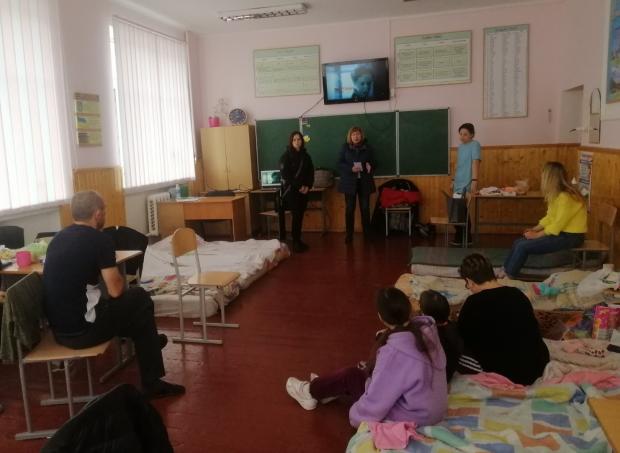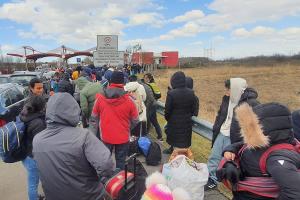OSCE steps up efforts to help Ukrainians fleeing the war to avoid nets of traffickers
By the beginning of May, according to UN Office for the Coordination of Humanitarian Affairs estimates, the war forced every fourth Ukrainian to leave his or her home. Five million Ukrainian refugees sought protection abroad, 7.7 million moved to safer locations within the country. It is as if all the people in Sweden and Lithuania decided to relocate. Those who leave their homes and move to other regions can become targets for human traffickers.
Nadiia Kondybina, an officer managing the OSCE Project Co-ordinator’s projects in the sphere of combating trafficking in human beings said: “The situation looked threatening already at the end of February. Images of huge lines of cars on the roads and people in lines at the border were everywhere – in the news and social media. I myself had to relocate from Kyiv and become an internally displaced person, but I was lucky as I had relatives to stay with and a job still. The vulnerabilities of many IDPs can be easily exploited and manipulated by criminals. We had to do something to help those people to avoid those risks”.
In early March, OSCE-supported social media channels were already distributing messages informing refugees about safety concerns and resources. Facebook and Instagram pages “Work Safe!”, created to promote safety among job-seekers abroad, were sharing verified hotline numbers to assist refugees. Chat-bot “Stay Safe” in Telegram was upgraded with a new section called “Military Action Forced to Leave the Country?” to provide information on potential risks, safety tips and useful contacts. To supplement these efforts, the Co-ordinator also produced a video for refugees staying abroad.
Reaching out to the internally displaced people
The Co-ordinator activated the previously created National Referral Mechanism – a network of non-governmental organizations assisting survivors of trafficking and ensuring co-ordination with authorities. Since April, members of these networks, civil society activists, have been visiting relief facilities such as shelters, sport-grounds turned into dormitories, and humanitarian aid distribution centers to talk to thousands of people in need.
Nataliya Kozlova, head of NGO ‘Progressive Women’ in Vinnytsia, says local authorities were glad to get print copies of leaflets, developed by the Co-ordinator, as people needed information. Handouts proved to be most required and helpful in offices where the displaced persons could obtain their documentation.
“When we talked to people at the pedestrian border crossing point to Moldova, some of them were reluctant to listen to us, as they were already under too much stress. Therefore, we started to hand out leaflets with the reference materials. When we visited temporary shelters and dormitories, IDPs were more inclined to listen and thanked us for the information provided,” said Kozlova.
When we talked to people at the pedestrian border crossing point to Moldova, some of them were reluctant to listen to us, as they were already under too much stress. Therefore, we started to hand out leaflets with the reference materials. When we visited temporary shelters and dormitories, IDPs were more inclined to listen and thanked us for the information provided.

Valentyn Borovikov, an activist from the city of Kropyvnytskyi, Kіrovograd region, central Ukraine, explains: “In most cases, we met with IDPs in humanitarian aid distribution centers or administrative service centers. I felt their urgent need to just speak out and share their grief. They talked about painful memories of leaving their hometowns.” Now Valentyn is planning to work with the regional employment centres and develop a training course on combatting trafficking in human beings for jobseekers.
In April, civil society activists, with the support of the Co-ordinator, held 196 meetings, providing consultation to more than 4000 IPDs in eight regions of Ukraine (including Lviv, Sumy, Volyn, Rivne, Chernivtsi, Vinnytsia, Kirovohrad, and Ivano-Frankivsk). More than 13,000 leaflets were also distributed.
The challenges faced by IDPs are immense and avoiding the risks of human trafficking is just one of them. The Project Co-ordinator is working to implement a number of other initiatives to enable its partners, authorities and civil society to assist those affected by the war, including through improved social services and legal support.








